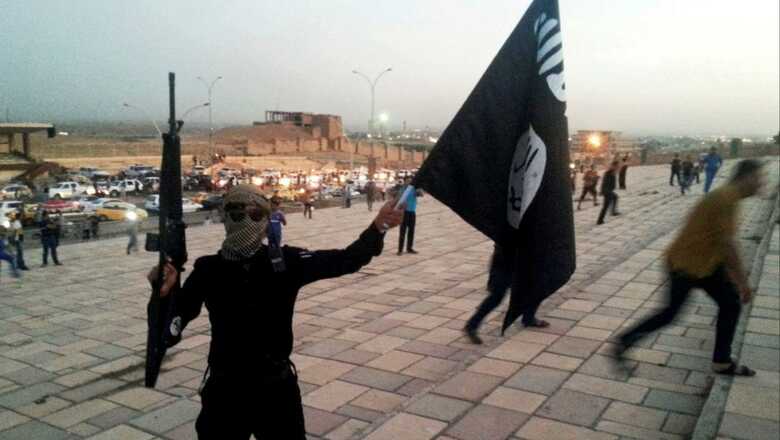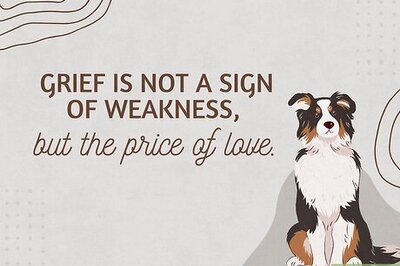
views
D-lysergic acid Diethylamide, or LSD, is a strong hallucinogenic drug that can produce profound, dose-dependent subjective effects in those ingesting the substance and leads to persistent psychiatric symptoms after its effects have worn off. The molecular formula C20H25N3O refers to Lysergic acid 2-butyl amide (LSB) Lysergic acid diethylamide (LSD).
Nations across the globe have become like drug-consumed zombies, helplessly watching, as drugs, migrants and terrorists crisscross the globe with impunity. Interestingly, it is the sea that is being utilised for this extravagant movement of terror, migrants and drugs. The seas have become more tempestuous, choppier and turbulent than ever before as refugees and irregular migrants which include, among others, clandestine, illegal, unauthorised, unlawful, undocumented, illegalised people, non-compliant, and without documents, swarm into Europe, the US and India, creating a demographic churning of unprecedented proportions. Sneaking in along with the hordes are indoctrinated terrorists, drug traffickers, and arms traffickers, moving in ships and ocean-going vessels of all kinds, deceptively carrying bulk cargo of dangerous drugs and arms.
India had the first taste of sea-borne terrorists in the year 2008, when highly trained and indoctrinated terrorists high on drugs, unleashed an orgy of violence on innocent and unsuspecting people. TIME Magazine of December 3, 2008, in an article titled ‘Were the Mumbai terrorists fuelled by Coke’ asks a pertinent question – “Did the jihadists who tore up Mumbai last week rely on party drugs usually associated with Western decadence to stay awake and alert throughout their three-day killing spree?” Britain’s Telegraph newspaper suggests that they did, citing unidentified officials claiming physical evidence shows the assailants used cocaine and other stimulants to sustain their violent frenzy. And if the notion of self-anointed holy warriors on a coke binge sounds incongruous, the report also maintains that the killers imbibed the psychedelic drug LSD while fighting advancing security forces.
“We found injections containing traces of cocaine and LSD left behind by the terrorists, and later found drugs in their blood,” the Telegraph was told by one official, whose nationality and relation to the investigation was not specified. “This explains why they managed to battle the commandos for over 50 hours with no food or sleep.”
The hallucinogenic and sensory-distorting effects of LSD make it an unlikely combat drug, even for kamikaze assailants who were, after all, seeking to kill as many people as possible before their own inevitable death. But the suggestion that the Mumbai jihadists may have amped themselves up on stimulants, typically forbidden by their strict Salafist brand of Islam, strikes some experts as plausible, particularly within the twisted jihadist logic in which holy ends justify impious means.
An article titled ‘This is your Jihad on Drugs’, by Paul Kan states “The link between crime, radicalism, and ISIL has only recently come into greater focus. Oil smuggling, extortion, and sex trafficking in ISIL-controlled territory are well-known, yet other crimes like drug production, trafficking, and consumption are not. It is important to better understand drug use and the drugs trade because both are helping ISIL commit atrocities and wage its campaign of terror. Viewing ISIL and other jihadist groups as mere collections of drug-crazed fanatics, however, would be a caricature. Organizations like ISIL use drugs for tactical, operational, and strategic reasons that are historically consistent with the behaviour of other violent groups in the past. It is worth considering drug consumption within ISIL and other jihadist groups as we consider how to fight them.
ISIL and other jihadist groups have not been deterred by Islam’s theological proscription against drug use and intoxication. They are able to rationalize their use of drugs as doing what is necessary to defeat their enemies. In fact, members of jihadist groups from West Africa to the Hindu Kush consume a wide range of narcotics as a way to enable their violent operations. Jihadi suicide bombers, for example, have been known to consume drugs as varied as heroin, meth, and Ritalin to steady themselves before detonating their devices. In Mali, jihadist fighters have taken advantage of cocaine being trafficked through their territory bound for European markets. Not only do they earn profits from “taxing” shipments as they transit through areas they control, they have used cocaine while committing atrocities. Drug consumption by jihadists is not a new phenomenon. During the Soviet–Afghan War, Afghan soldiers and the mujahedin routinely used hashish before and after violent engagements. When fighters ingest drugs to meet religiously inspired goals, they are imbued with not only courage but also a sense of righteousness. For them, drug use is not immoral, but sacred because it helps an individual link the earthly with the divine”.
“ISIL’s ‘Captagon Caliphate’ is consistent with what Mary Midgley in her book ‘Beast and Man’ argues is a universal human drive to seek intoxication, whether during war or in peacetime. Indeed, as Paul Gahlinger argues, the many reasons individuals use drugs in times of peace are the same as the reasons for using them in an atmosphere of organized violence: to numb the body, for recreation, to fit in with a social group, for social functioning, for mind expansion, to connect with the divine, to improve performance, to change the body, and for self-medication. These reasons are a combination of what sociologists have labelled the “setting and set” — the physical and social environment in which the drug is taken is considered the “setting” while the intended effects on the consumer are known as the “set.” When placed together in the context of ISIL, the set is the individual’s violent capacity and tolerance for violence and the setting is the violent expansion, consolidation, and protection of their self-proclaimed state and theocratic ideology”.
Whether it is the Hamas in Gaza, Hizbul Mujahedeen and Lashkar-e-Taiba in Kashmir, and Rohingya militants in Myanmar-India-Bangladesh, it is the same philosophy of religion-drugs-killings, that enthuse all of them.
The use of dangerous drugs like Captagon, cocaine, and LSD allows an individual to easily prove himself to his comrades and eases his transformation into the context of brutal hostility and organised violence. The consumption of drugs, therefore, aids in fostering small group cohesion as individuals experience and survive danger with their fellow terror comrades. For terror groups, drug use has clear operational and strategic benefits. Drug consumption helps these groups enhance their fearsome reputations as they commit horrifying atrocities on women and young children to support their crazy ideology, instill deep fear among people and attract others to their cause. The captured Iraqi community of Yazidis suffered what John Mueller in his book ‘Remnants of War’ describes as a “carnival”, where militant groups seize a town, then celebrate by consuming intoxicating drugs and indulge in gory orgies of rape of girls, women and even old ladies, followed by gruesome torture and murder. Female Yazidi survivors testified to the United Nations about drug-intoxicated ISIL fighters indulging in brutal rape of girls and women of all ages. This same strategy has been employed by Hamas terrorists against Israeli girls, in the current conflict underway in Gaza.
Drug consumption certainly influences the tactical behaviour of terrorists in conflict zones like Kashmir and Gaza. Army and para-military forces confronting terrorists are encountering drugged fighters who strike in unfamiliar and seemingly irrational ways. Drug consumption causes unpredictability when countering these groups’ operations, as seen routinely in Kashmir.
The Red Sea is becoming the latest hotbed of conflict, as the freedom of navigation in the Bab-el-Mandeb is being threatened by Houthi aggression, steered by Iran. According to the US Central Command (CENTCOM), more than fifteen instances of Houthi militants targeting commercial shipping since October 17, 2023, have occurred. These Houthi militants are even equipped with anti-ship ballistic missiles and drones and declare themselves to be part of the Iranian-led “axis of resistance” against Israel, the US and the wider West, along with Hamas and Hezbollah. Two Indian ships have also been targeted recently.
As the threats posed by terror organisations continue to evolve, most nations continue to dither, vacillate, or are deterred by considerations like ‘human rights’, ‘migrant rights’ and ‘religious freedom’. One half of the world appears to be sinking in cowardice, while another is celebrating the slaughter of innocents. Consider for example, Maldives, a small island nation, with a meagre population of around half a million, supplied the world’s highest per capita number of terrorists to Syria and Iraq. Yet, tourists from all over the world flock to the Maldives to relax on the beaches, little realising that the tourism funds are partly used to train and groom future drug-addicted terror fighters. No nation, including India, has shown the guts to ban their nationals from visiting Maldives.
Terror-affected nations are helplessly pleading of being bound by agreements, commitments, and treaties, while terrorists and their sponsor countries, brazenly call for even annihilation of many nationalities and religious followers. Hamas MP and Cleric Yunis Al-Astal openly declared they would “conquer Rome, and from there continue to conquer the two Americas and Eastern Europe.” The entire world is in a Zombie-like trance, unable to even react. Can Europe not produce warriors of the calibre of Charles Martel and Henri Joseph Eugène Gouraud? Why West Point cannot create anymore a George S. Patton or India a Chhatrapati Shivaji Maharaj? It seems modern military academies do not churn out fiery generals but only bureaucratised ones.
Despite every nation having a national strategy for combating terrorism, and over a decade of experimenting with various counter-terrorism strategies, and even a United Nations Global Counter-Terrorism Strategy, there is no respite for many nations, from the scourge of terrorism being unleashed on every continent by people of a particular religious denomination.
Can nations fettered by democracy, human rights, religious freedom, press freedom, secularism and independent judiciary ever curb terrorism? It seems an unequal battle is happening, and nations instead of protecting their sovereignty are hell-bent on committing hara-kiri in the name of human rights, and religious freedom of terrorists, drug traffickers and arms traffickers.
The writer is a retired officer of the IRS and the former director-general of the National Academy of Customs, Indirect Taxes & Narcotics. Views expressed in the above piece are personal and solely that of the author. They do not necessarily reflect News18’s views.



















Comments
0 comment